Demand Letter from Attorney Template
Are you a small business owner dealing with legal issues or disputes? Are you looking to recover debts, resolve contract breaches, and effectively communicate your legal position? If so, then a demand letter from an attorney may be the answer. In this article we will discuss how demand letters can be invaluable tools for small business owners. We’ll cover topics such as what they are, when to use them, and provide three templates for writing one yourself. So if you’re ready to take control of your legal disputes, read on!
Table of Contents
If you are looking for other templates or a general introduction to the concept of demand letters, please have a look at our demand-letter guide.
What is a Demand Letter from an Attorney and What Types Are Sent by Lawyers?
A Demand Letter from an Attorney is not just a simple piece of correspondence; it is a potent legal instrument. It’s often the first formal step taken in a plethora of legal situations and is aimed at resolving disputes before they escalate into potentially lengthy and costly court proceedings. The purpose of these letters is manifold: they inform the recipient of the sender's rights and claims, enumerate specific demands, and usually give the recipient a fixed time frame to fulfill these demands. Demand letters are especially effective as they are crafted and sent by lawyers, which signals the seriousness of the issue at hand.
There are several types of demand letters often sent by lawyers:
- Payment Demand Letter: When an individual or entity fails to make a payment that they are obligated to, be it overdue bills, loan repayments, or any other financial obligations, a Payment Demand Letter serves as a formal request for the payment due. This type of letter clearly itemizes the amount owed, any interest accrued, and the deadline for payment. It can also mention the intention to initiate legal proceedings if the payment is not made within the stipulated time.
- Cease and Desist Letter: This is employed when an individual or entity is engaged in actions that are bothersome, infringing on rights, or illegal. A Cease and Desist Letter is a stern request to halt such activities. Common instances where such letters are used include harassment, trademark infringement, or libel. The letter must detail the offending activity and assert the legal rights of the sender, warning of legal repercussions if the activity does not cease.
- Personal Injury Demand Letter: In cases where an individual has suffered injuries due to the negligence or wrongdoing of another party, a Personal Injury Demand Letter is used to claim compensation. The letter should comprehensively describe the incident, injuries sustained, medical treatments undergone, any loss of earnings, emotional distress, and any other damages. It should also include a specific monetary amount being claimed as compensation.
- Breach of Contract Letter: When a contract is violated or its terms are not adhered to, a Breach of Contract Letter is sent. This letter delineates the terms that were breached, the nature of the breach, and what actions are required to rectify the situation. It also lays out the potential legal actions that might be taken if the breach is not remedied.
- Security Deposit Return Letter: Often utilized in landlord-tenant relationships, a Security Deposit Return Letter is sent by a tenant’s attorney to demand the return of a security deposit after the lease is terminated. The letter should detail the condition in which the property was left, the amount of the security deposit, and the expected timeline for the return of the deposit.
Need a different format? Browse all demand letter templates.
Sample - how does a demand letter from an Attorney look like?
When it comes to sending a demand letter, having an attorney is imperative. This isn't a situation where a simple downloaded template will suffice. It’s essential to craft a letter that carries legal weight and precision. To get you acquainted with the caliber and structure of an effective demand letter, we are providing you with 3 exemplary samples for free. These samples will serve as a roadmap, illuminating how the content can be customized depending on the specific demands and circumstances.
Demand Letter from Attorney Template
Sample 1: Debt Collection Demand Letter from Attorney
[Your Law Firm's Name]
[Your Law Firm's Address]
[City, State, ZIP Code]
[Date]
[Debtor's Name]
[Debtor's Company Name]
[Debtor's Address]
Re: Final Demand Letter Prior to Legal Action
Dear Mr./Ms. [Debtor's Last Name],
On behalf of our client, [Creditor's Name], we at [Your Law Firm's Name] are writing to formally notify you of an outstanding payment that remains unpaid. It is important that you take this matter seriously as it pertains to a significant debt owed to our client.
According to the agreement between you and our client, as documented in the invoice dated [Invoice Date], you owe a total of $[Total Amount Owed] for the [description of goods or services provided].
Regrettably, this payment has now become [number of days overdue] days overdue, and it is our obligation to inform you that this delay will result in the application of interest charges. Our client, [Creditor's Name], imposes a reasonable interest rate of [Interest Rate] per [Interest Calculation Period] for such delays. Therefore, as of the writing of this letter, you will be charged an additional $[Interest Amount] for the [number of days overdue] day period, bringing the total amount owing to $[Total Amount Owed + Interest].
We must emphasize that this letter serves as the final warning before our client pursues legal action to recover the outstanding debt. It is in your best interest to rectify this situation promptly. We kindly request that you remit the full payment of $[Total Amount Owed + Interest] within [Number of Days] days from the receipt of this letter.
Failure to comply with this demand for payment within the specified timeframe will leave our client with no alternative but to initiate legal proceedings against you. It is our sincere hope to avoid such measures and resolve this matter amicably.
Should you require any clarification or have any questions regarding this demand, please do not hesitate to contact our firm at [Your Law Firm's Phone Number]. Our dedicated team will be ready to assist you.
We strongly urge you to treat this matter with the utmost urgency. Your immediate attention to this demand for payment will help prevent the escalation of this issue.
Yours sincerely,
[Your Name]
Attorney | [Your Law Firm's Name]
Sample 2: Breach of Contract Demand Letter from Attorney
[Your Law Firm's Name]
[Your Law Firm's Address]
[City, State, ZIP Code]
[Date]
[Recipient's Name]
[Recipient's Address]
[City, State, ZIP Code]
Re: Notice of Breach of Contract and Request for Remedial Action
Dear Mr./Ms. [Recipient's Last Name],
I write on behalf of my client, [Client's Name], to inform you that you are in violation of the [specific type of contract, e.g., Non-Disclosure Agreement] dated [Date of Agreement], entered into between yourself and my client.
The specific provisions of the Agreement that you have breached are as follows:
[Specify the section/clause]: [Brief description of the provision] - This provision mandates that [brief explanation of what the provision requires or prohibits].
Evidence has been brought to our attention that demonstrates your violation of this provision by [explain how this provision was breached in detail].
[Repeat as necessary for additional provisions that have been breached].
The above-mentioned breaches are serious and have caused, or are likely to cause, significant harm to my client’s interests.
As per the Agreement, my client is entitled to pursue various legal remedies to address these violations. However, my client is willing to resolve this matter amicably and without resorting to litigation, provided that prompt and appropriate action is taken to remedy these breaches.
To that end, we demand that you undertake the following actions by [specific date, typically two weeks from the date of this letter]:
[Specify the actions that need to be taken to remedy the breaches].
[Repeat as necessary for additional remedial actions].
Please be aware that failure to comply with these demands within the specified time frame will leave my client with no option but to pursue all available legal remedies to protect their rights and interests, including filing a lawsuit. As stated in [specific section/clause] of the Agreement, the prevailing party in any legal proceedings related to this Agreement is entitled to recover attorney’s fees and other related costs.
This letter is not an exhaustive statement of my client’s rights, legal or otherwise, in connection with the above matter, all of which are expressly reserved.
We urge you to treat this matter with the urgency and seriousness it deserves. Please feel free to contact our office at [Your Law Firm's Phone Number] should you wish to discuss this matter further or need any clarification.
Sincerely,
[Your Name]
Attorney | [Your Law Firm's Name]
Sample 3: Cease and Desist Demand Letter by a lawyer
[Your Law Firm's Name]
[Your Law Firm's Address]
[City, State, ZIP Code]
[Date]
[Recipient's Name]
[Recipient's Address]
[City, State, ZIP Code]
Re: Cease and Desist Notice for [Specify the Issue, e.g., Trademark Infringement, Harassment, Defamation]
Dear Mr./Ms. [Recipient's Last Name],
I represent [Client's Name], and I am writing to address a serious issue involving your actions concerning [briefly describe the nature of the unauthorized activity or conduct, e.g., unauthorized use of trademark, harassment, or defamation]. This letter serves as a formal demand for you to immediately cease and desist all such activities and conduct.
It has come to our attention that [describe the activities or conduct in question with specificity, and where applicable, provide dates and evidence of the actions]. These actions are unlawful and infringe upon my client's [legal rights, intellectual property, reputation, etc.].
Under [relevant state or federal laws or statutes], such activities and conduct are prohibited and create liability for, among other things, [list applicable - e.g., damages, injunctive relief, attorney’s fees, etc.].
My client has the unequivocal right to [describe rights, e.g., use and protect its intellectual property, be free from harassment, protect their reputation from defamatory statements, etc.], and your actions constitute a clear infringement of these rights.
We demand that you immediately:
Cease and desist from engaging in any further such actions or conduct.
[List any additional specific actions the recipient must take to remedy the situation, such as removing infringing content, retracting statements, etc.].
Provide written assurances within [a specific number of days, e.g., 10 days] from the receipt of this letter that you have complied with the above demands.
Please be advised that this letter is not a comprehensive or complete statement of my client’s legal rights, remedies, claims, or defences, all of which are expressly reserved.
If you do not comply with the demands set forth in this letter, please be advised that my client is prepared to take all necessary legal actions to enforce their rights and to seek remedies to the fullest extent of the law.
We recommend that you consult with an attorney regarding your actions to comprehend the gravity of the situation and the potential consequences of your actions.
Should you or your counsel wish to discuss this matter or if you have any questions, please do not hesitate to contact me at [Your Law Firm's Phone Number].
Sincerely,
[Your Name]
Attorney | [Your Law Firm's Name]
Note: This is a general example of a demand for payment letter. The actual information and phrasing should be adapted based on your specific situation and legal counsel, as applicable. This information does not constitute legal advice and it is always best to consult with a legal professional in your area for tailored guidance.
Are you looking for other demand letter templates?
Klik here to browse our full library.
What Should You Consider Before Hiring a Lawyer to Send a Demand Letter?
Before hiring a lawyer to send a demand letter, it’s important to consider the following:
- Necessity: Determine if the situation warrants legal intervention.
- Quality of Evidence: Ensure you have substantial evidence to support your claim.
- Cost-Benefit Analysis: Evaluate if the potential outcome justifies the expense.
- Attorney’s Expertise: Select an attorney with experience in the relevant field.
- Alternate Dispute Resolution: Explore other avenues like mediation or negotiation.
What is the Cost of Hiring an Attorney to Send a Demand Letter?
The cost of hiring an attorney to send a demand letter varies based on factors such as the lawyer’s experience, geographic location, and complexity of the case. Generally, attorneys might charge a flat fee ranging from $100 to $1000 for a demand letter. Some attorneys may charge by the hour, ranging from $100 to $400.
Debitura is not a law firm or debt collection agency. Instead, we are a platform that connects you with vetted local collection agencies and lawyers worldwide. Leverage our network of 500+ local collection agencies and lawyers across 183 markets for effective, on-the-ground debt recovery.
•Hand-picked Agencies: We connect you with the best debt collection agencies and law firms worldwide.
•Performance-Based Selection: Our partners are constantly tested and evaluated to ensure top performance.
•Access to the Best: Only the best-performing agencies remain in our network, giving you access to superior debt recovery services regardless of where your debtors are.
Simplify your legal framework with our 'No Cure, No Pay' standardized agreement across all local partners. Ensuring convenience for international creditors, we offer a standard debt collection agreement across jurisdictions and local partners.
•No Cure, No Pay: Enjoy risk-free pre-legal debt collection with no upfront costs.
•Standardized Pre-legal Agreement: Our partners adhere to a transparent and standardized debt collection agreement, streamlining your legal framework across jurisdictions and partners.
•Competitive Legal Rates: For legal interventions (lawsuits, debt enforcement, insolvency proceedings, etc.), receive up to 3 competitive quotes from our network of local attorneys.
Explore our pricing
Quick, professional and hassle-free B2B and B2C debt collection. 87% Consistent recovery rate – a testament to our global effectiveness. 4.97/5 Average rating from a diverse global clientele of over 5,000.
Register for a free profile and effortlessly upload your claim within just 2 minutes. We match your request with our expansive network of over 500 attorneys and collection firms to get you started quickly.
Access competitive legal action rates worldwide through our network of 500+ local attorneys. For legal interventions (lawsuits, debt enforcement, insolvency proceedings, etc.), receive up to 3 competitive quotes from our network of local attorneys.
Consolidate all your cases worldwide in one platform. Enjoy seamless case upload, management, and reporting. Upload cases manually, via CSV files, or utilize our REST API for custom integrations with full technical support from our developers.
What Are the Advantages of Sending a Demand Letter from an Attorney?
Sending a demand letter from an attorney offers several advantages that can significantly impact the resolution of a dispute. Let's explore these advantages in more detail:
- Professionalism - Carrying Weight and Authority: When a demand letter comes from an attorney, it automatically carries a higher level of professionalism and credibility. The recipient recognizes that legal expertise is backing the claims being made. This professional approach can compel the recipient to take the matter seriously and increases the likelihood of a swift response.
- Clarity of Claim - Outlining Issues and Demands: A demand letter crafted by an attorney ensures that the issues at hand are clearly articulated. Attorneys possess the legal acumen to present the facts concisely and accurately, leaving no room for ambiguity. By outlining the demands with precision, the recipient can fully comprehend the nature and extent of the claim being made.
- Legal Compliance - Meeting Legal Standards: One crucial advantage of involving an attorney in the creation of a demand letter is the assurance of legal compliance. Attorneys have in-depth knowledge of relevant laws and regulations pertaining to the specific dispute. They can ensure that the letter is drafted in accordance with legal standards, protecting the sender's interests and avoiding any pitfalls that may weaken the claim
- Evidence of Communication - Establishing a Paper Trail: Sending a demand letter creates a documented record of communication between the parties involved. In the event that the dispute escalates and ends up in court, the demand letter serves as evidence of an attempt to resolve the matter amicably before resorting to litigation. This can strengthen the sender's position by demonstrating their willingness to engage in constructive dialogue.
- Potential for Resolution - Avoiding Costly Court Proceedings: One of the primary goals of sending a demand letter is to seek a resolution without going to court. Demand letters are often effective in prompting the recipient to reconsider their position and engage in negotiations. The formal and professional nature of the letter, coupled with the clear demands and legal implications, can encourage the recipient to respond and work towards a resolution. This can save both parties significant time, expense, and stress associated with protracted court proceedings.
What Are the Key Elements to Include in a Demand Letter?
- Letterhead of the Attorney: Professional header with attorney’s contact information.
- Date: The date the letter is issued.
- Recipient's Information: Name and address of the party to whom the letter is addressed.
- Subject: A brief statement on the purpose of the letter.
- Factual Background: A clear summary of relevant facts and events.
- Specific Demand: Clearly stated demands with deadlines.
- Legal Basis: The legal grounds for the claim.
- Documentary Evidence: Reference to supporting documents.
- Conclusion: Final remarks including potential legal actions if demands are not met.
- Signature: The attorney’s signature.
Step by Step Instructions on How to Write a Demand Letter as a Lawyer
- Gather Information: Compile all relevant information and documents.
- Draft Letterhead: Use professional letterhead with contact information.
- Include Date and Recipient’s Information: Date and address the letter properly.
- Write the Subject: Keep it concise and informative.
- Outline Factual Background: Provide a chronological account of events.
- State the Demand: Be clear and specific with your demands.
- Provide Legal Basis: Cite relevant laws or contracts.
- Reference Supporting Documents: Mention and attach any supporting documents.
- Conclude the Letter: Reiterate demands and indicate potential legal actions.
- Review and Sign: Proofread the letter for accuracy and sign it.
What to Do After the Lawyer Has Sent the Demand Letter?
- Monitor the Response: Keep track of the recipient’s response within the given deadline.
- Evaluate the Reply: If a reply is received, evaluate it with your attorney.
- Negotiate: Be open to negotiation for an amicable resolution.
- Plan Next Steps: If no satisfactory response is received, discuss the next steps, such as filing a lawsuit, with your attorney.
.webp)

.svg)



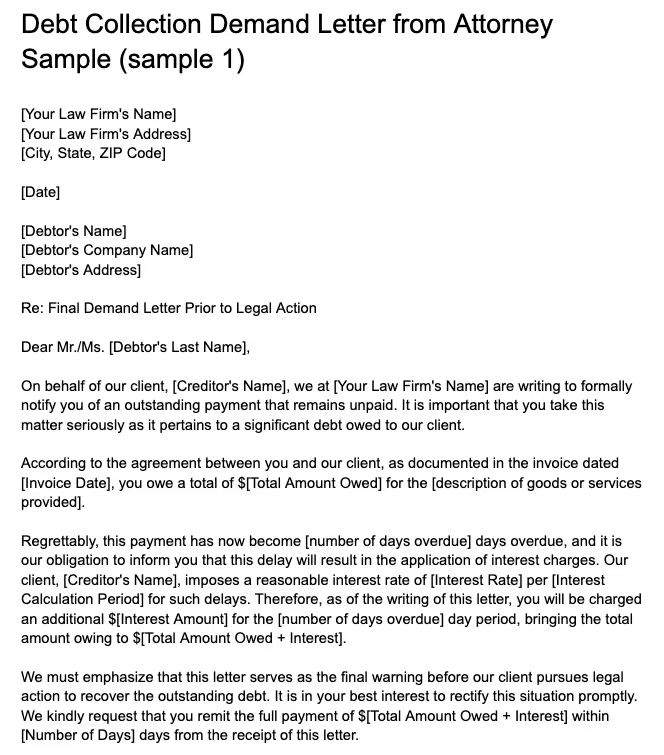
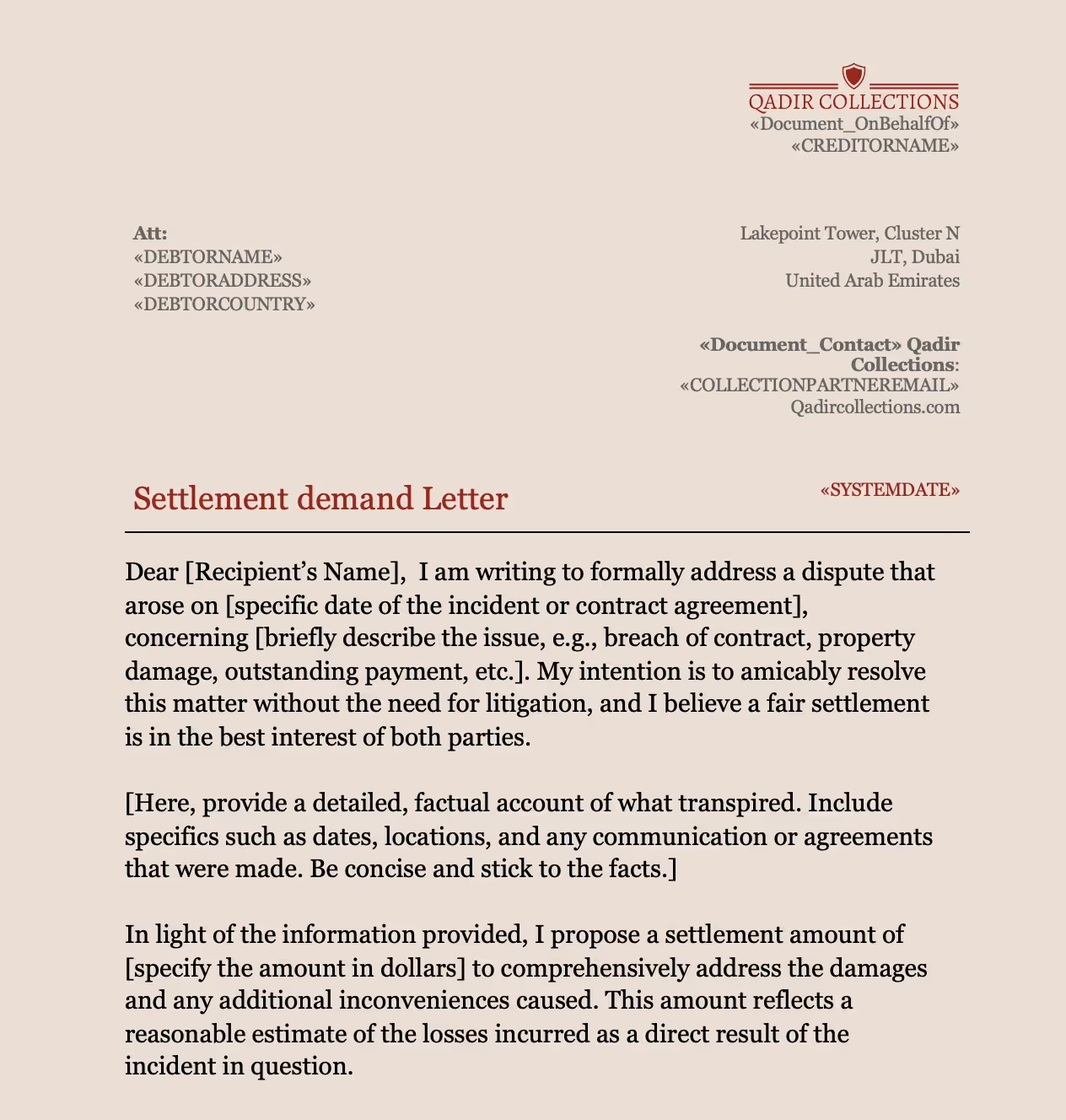
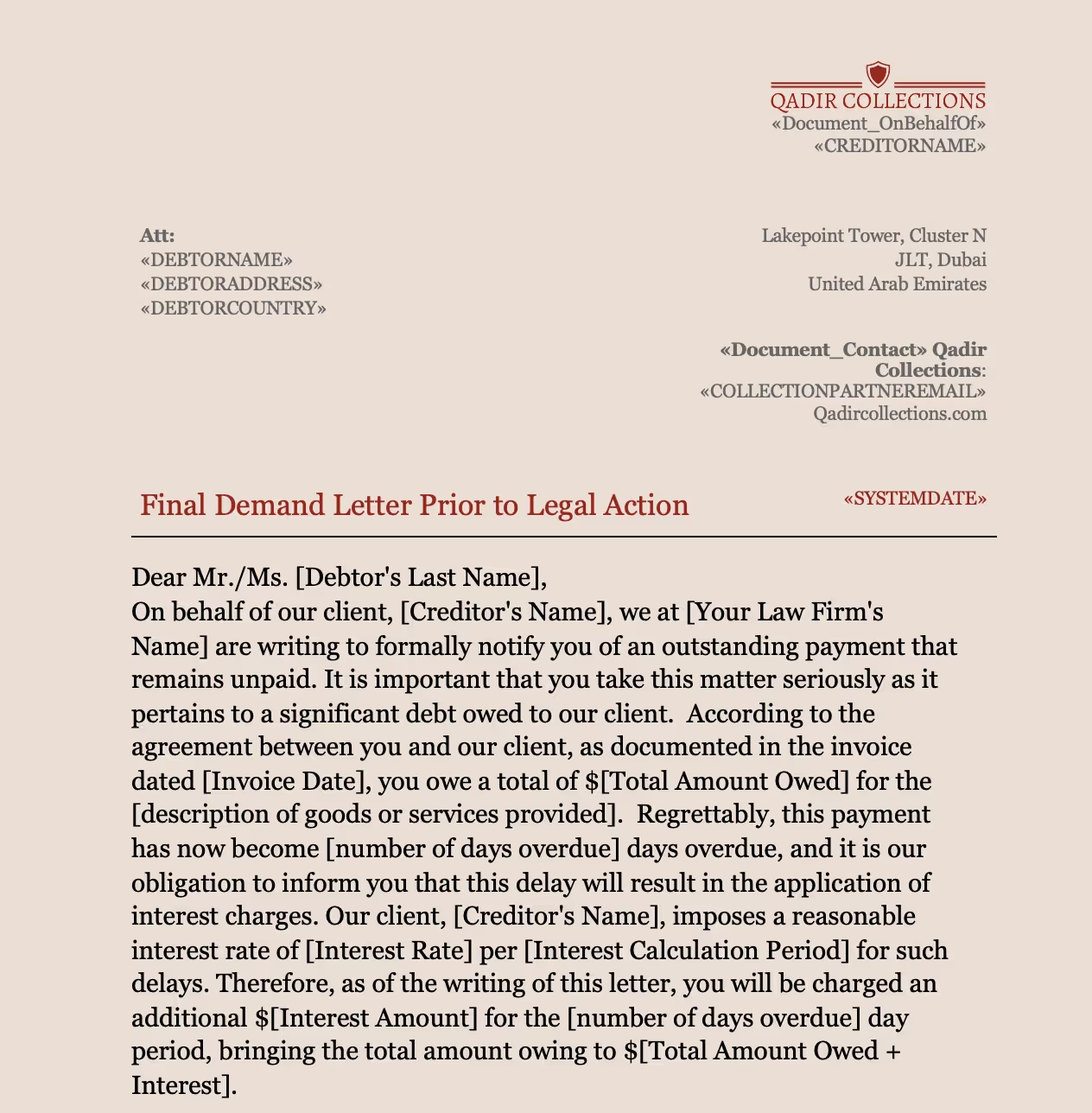
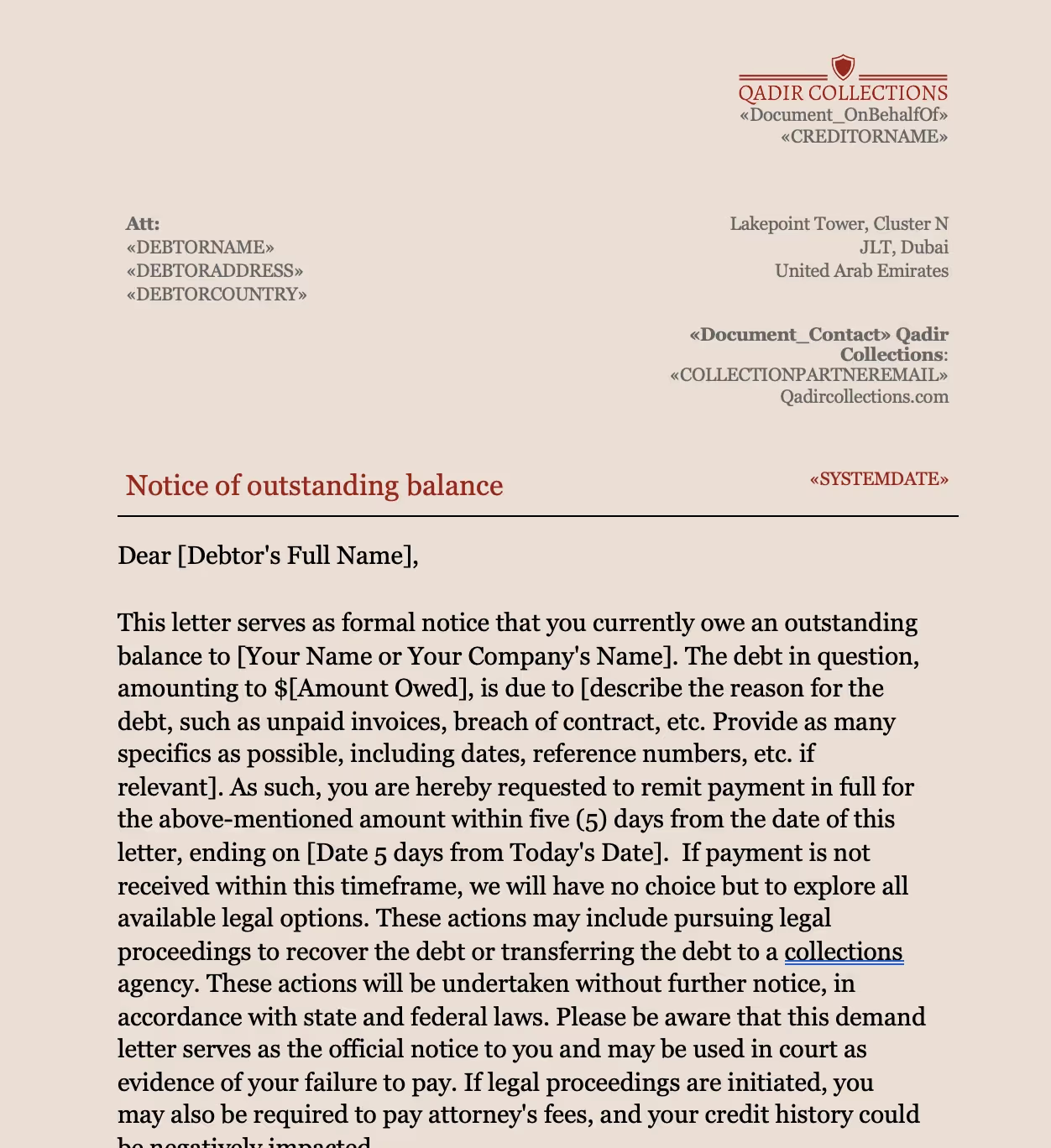
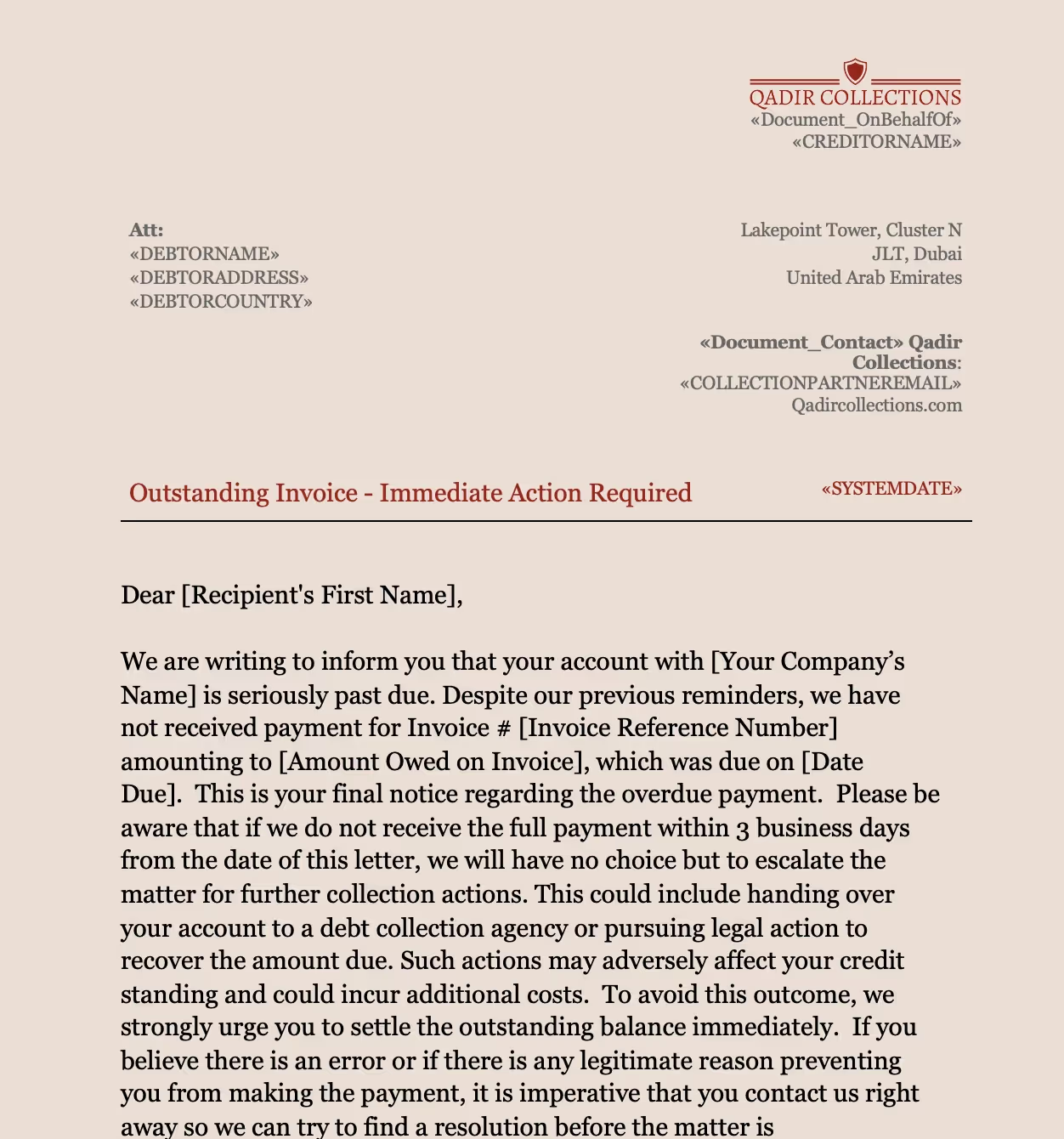
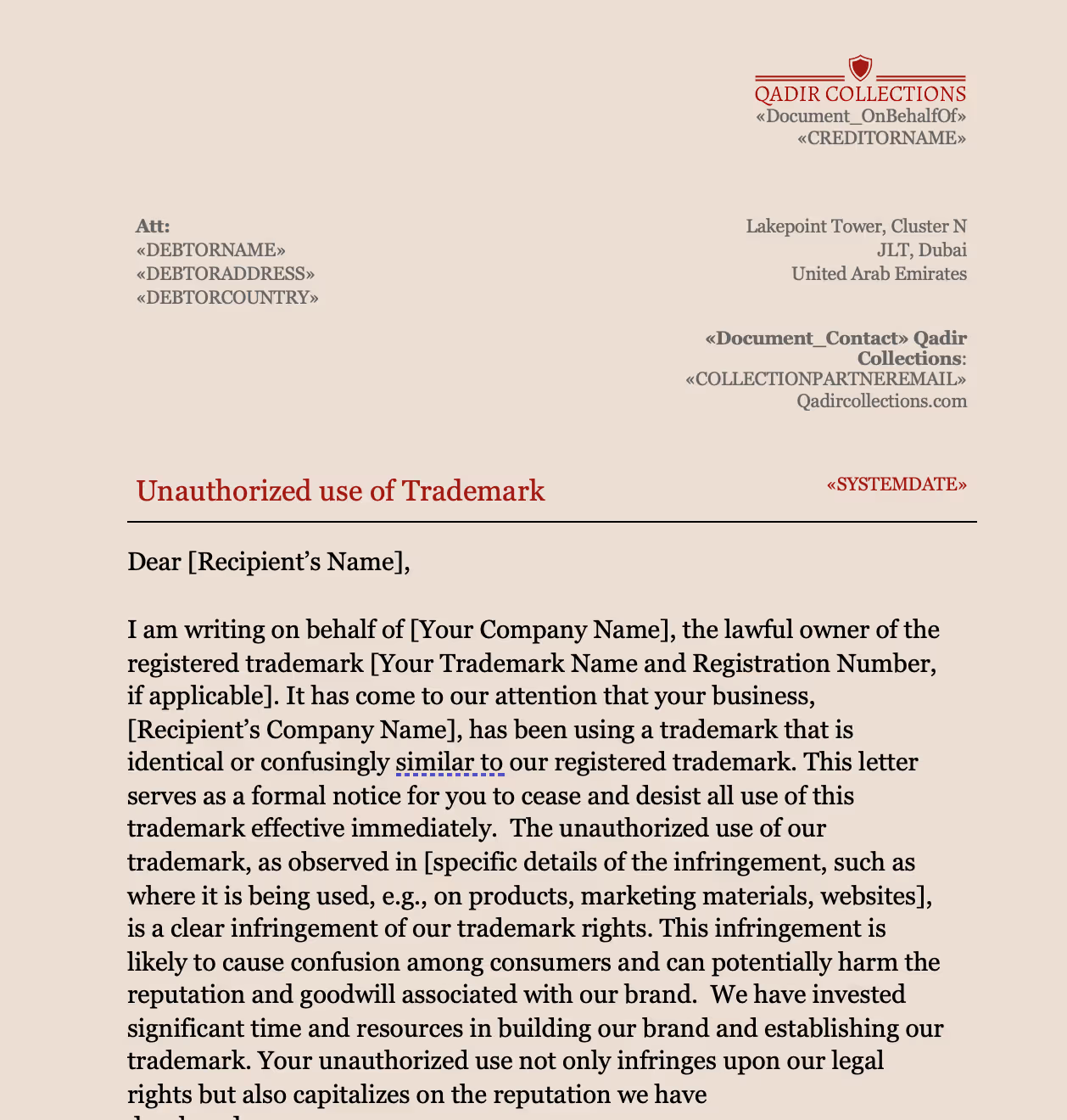
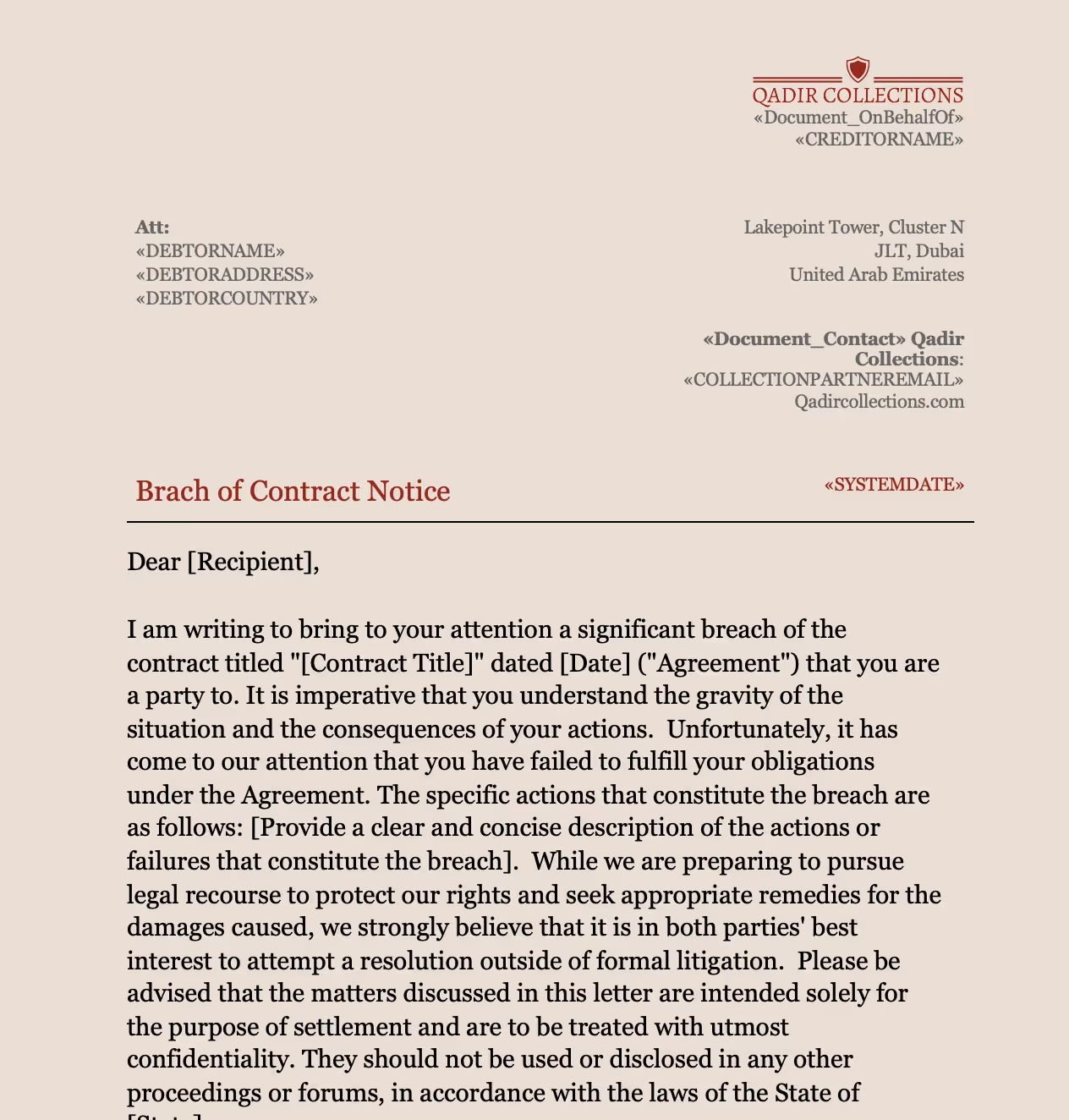
.webp)
